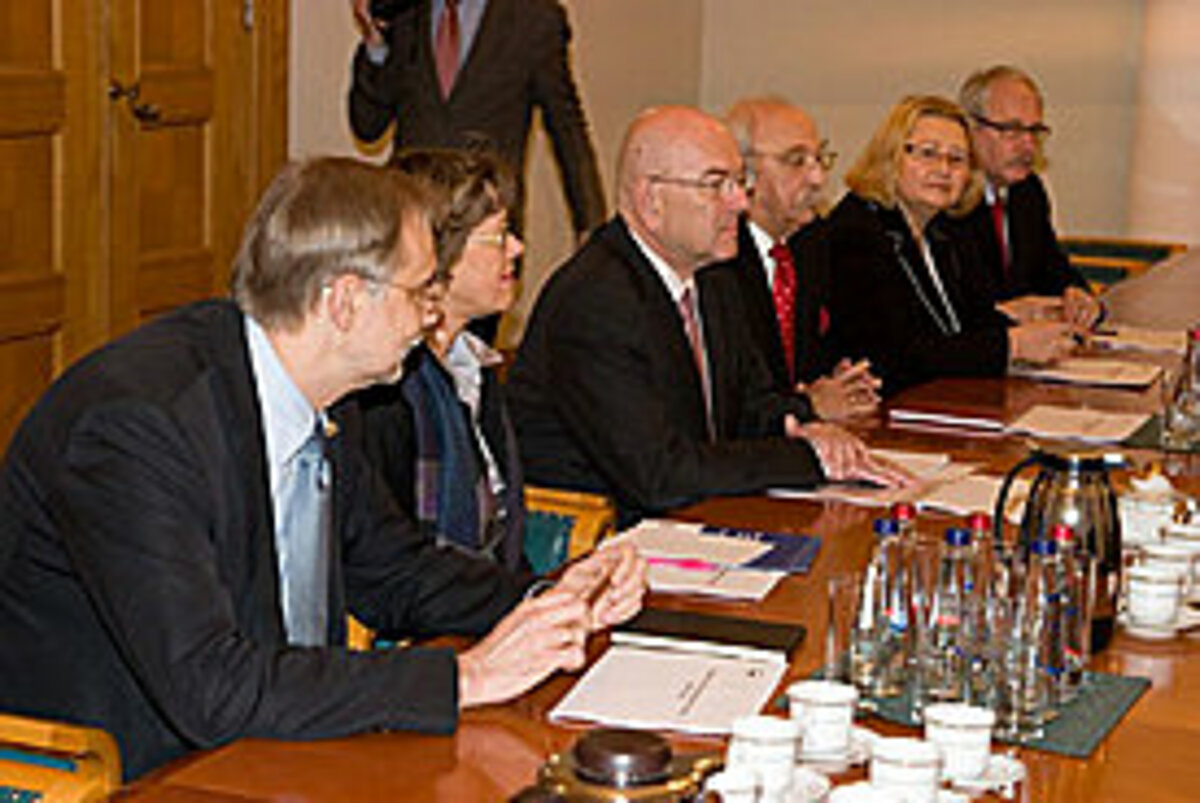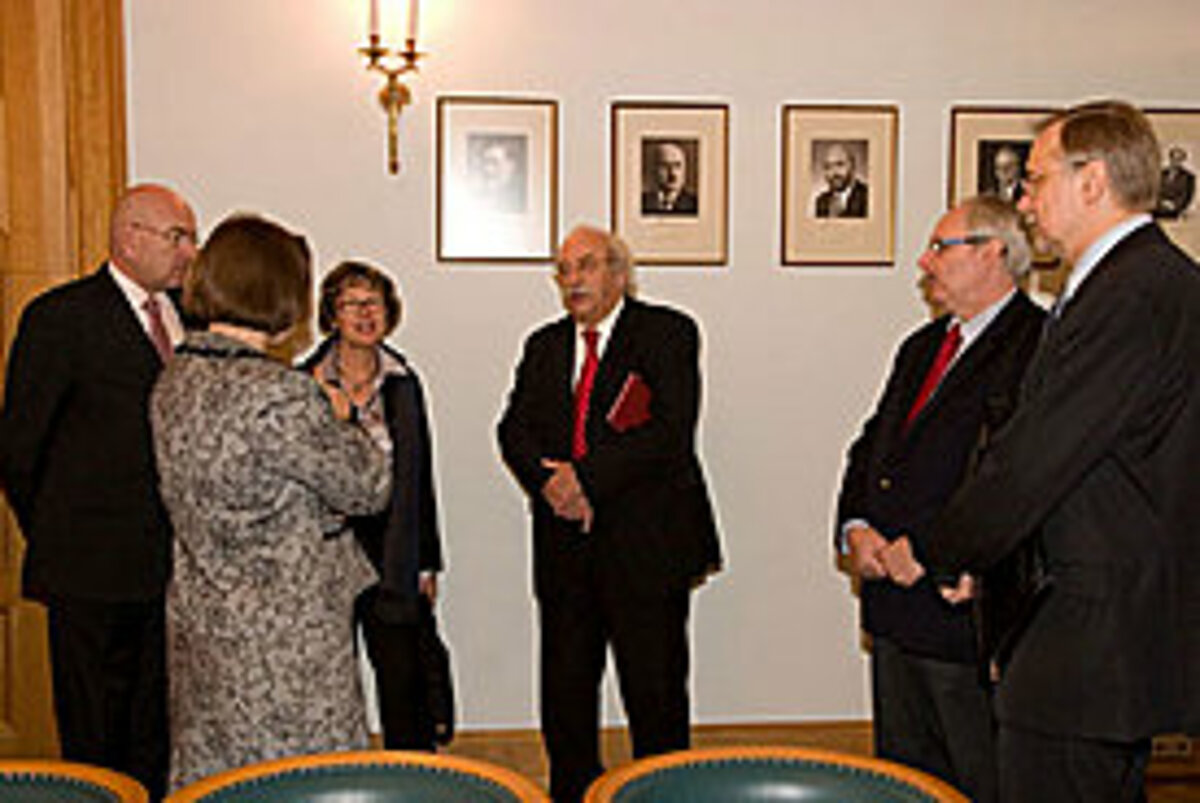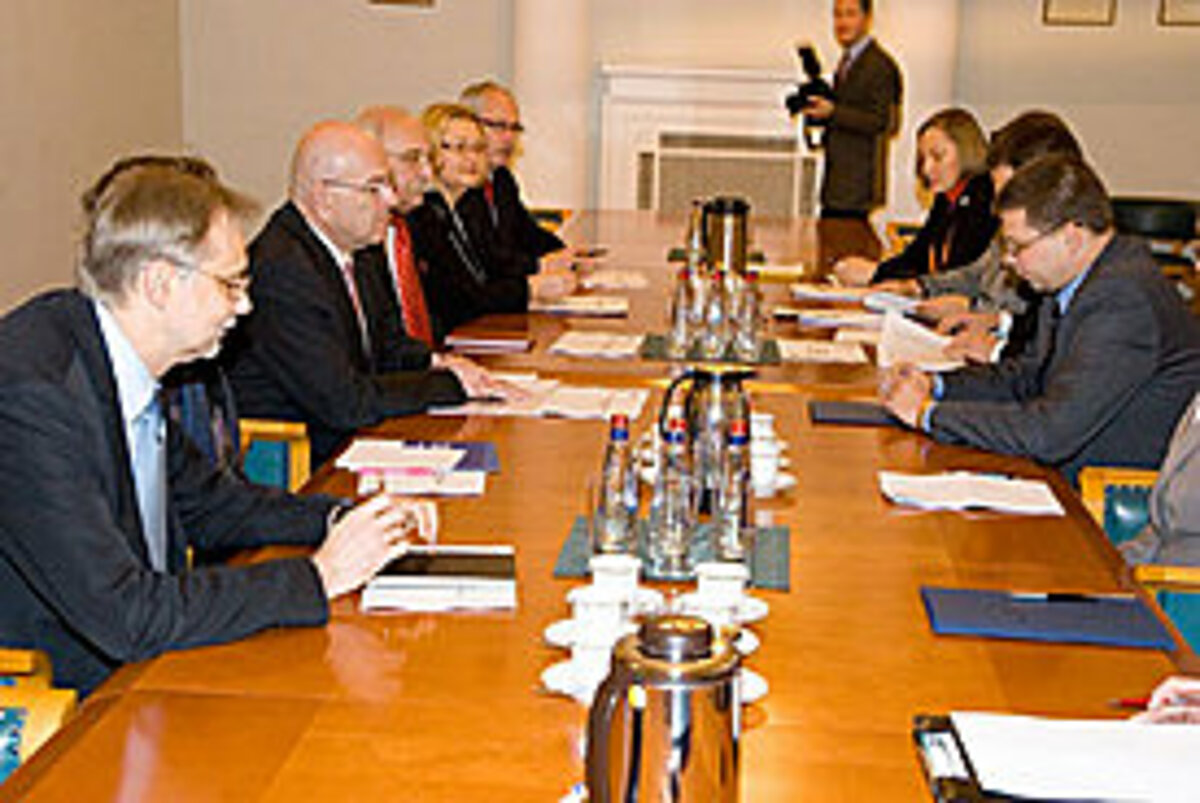
The delegation of the EUA was led by the Association’s President Prof. Jean-Marc Rapp. The delegation also included the Secretary General of the EUA Lesley Wilson and a member of the Board, President of the Conference of Rectors of Academic Schools in Poland (CRASP) Prof. Tadeusz Luty. The Latvian higher education institutions in the talks with the government officials were represented by the Chairperson of the Latvian Rectors’ Council Tatjana Volkova, the Chairperson of the Association of Latvian Universities Mārcis Auziņš and the Secretary General of the Latvian Rectors’ Council Andrejs Rauhvargers.
The EUA delegation came to Riga because of its concern about the financial situation of the higher education in Latvia due to the severe cuts (by 47 %) of higher education funding in 2009; what is more, the higher education budget is planned to be further reduced by 23 % in 2010. When asked about the situation of higher education funding in Poland, T. Luty said that Polish Government has not reduced its funding for higher education institutions, but it has instructed them to draw up an additional “crisis budget” (reduced by 10 %) apart from their budget plans in case it would be necessary to implement it.
During the talks EUA President J.M. Rapp and other representatives of the delegation stressed that they had come to Latvia as they were concerned about the future of Latvian higher education and the overall future of Latvia. “We cannot just look at the problems Latvian higher education is facing, even if we could use it to our advantage and attract students and qualified teaching staff from Latvia - any European country could benefit from it, but it is not in line with the EUA policy. Europe needs strong Latvia with strong higher education institutions,” said J.M. Rapp.
Delegates emphasized that every contribution to higher education is a quick-profit investment, not an expense, and they warned Latvia against loosing the new generation of students, as then the economic recovery would be much harder, and it would take decades to regain even the present positions. The PM V. Dombrovskis expressed his support for the higher education, but, in the light of the national budget situation, he refrained from giving any promises.
The representatives of the EUA understand that it might be impossible for Latvia to do a full system audit now, but before actively starting structural reforms, they urged to do an international expertise of the proposals and plans for reforms to be carried out by high-level experts – former or present rectors or ministers from countries where reforms have been implemented successfully.
The EUA could help Latvia by providing free expertise; Latvia should only cover the trip costs of the experts. The PM V. Dombrovskis expressed his interest about the offer and readiness to continue the collaboration of the National Government, the Latvian Rectors’ Council and the EUA in this area.
The EUA representatives stated that nowadays higher education institutions can stay competitive only by internationalizing their work which implies a whole complex of measures – study programmes in foreign languages, international teaching staff, intensive student mobility and joint programmes with higher education institutions from abroad. J.M. Rapp emphasized that internationalization of higher education institutions is especially important for smaller countries and he informed how the language issue is being dealt with in his country – Switzerland: if a study programme in a higher education institution is available in the language spoken in the respective part of Switzerland, in addition it can be also offered in any other foreign language.
The EUA representatives also advised using money from EU Structural Funds for the purposes of higher education to counteract the funding reductions, for example, award scholarships to students so they could cover the tuition fee. This approach would support both students and higher education institutions at the same time; furthermore, the principle “money follows the student” would be observed. EU grants are available to a part of doctoral students and to graduate students in a limited number of fields, but they are not available to students of bachelor study programmes.
Another aspect which could benefit from Structural Funds is recruiting of international teaching staff, which otherwise is very difficult to provide funding for.
During the talks with the members of the Parliament it was also pointed out that, in order to carry out innovations in the higher education and to facilitate graduate employment, it is essential to fully implement a set of reforms agreed upon by the European countries in Bologna Declaration. However, the implementation of most reforms is blocked by the absence of Law on Higher Education; in this regard J. Strazdiņš informed that in late November, 2009, the National Parliament will resume its review of the draft law. In conclusion of the meeting at the Latvian Parliament, J. Strazdiņš and B. Rivža thanked the EUA delegation for their support and advice which might prove useful in further debates about the budget.
The Latvian Rectors’ Council is a member of the EUA since its foundation in 2001 when several European higher education organizations consolidated.
The EUA is the main representative of the higher education institutions in Europe and as such participates in the discussions about the education and science policies with the European Parliament, the European Commission and organizations of higher education institutions from other parts of the world. More than 600 best European universities are individual full members of the EUA. In order to become an individual full member of the EUA, a university must meet a set of requirements, including that it must have a doctoral programme that has awarded doctoral degrees in the recent years. In Latvia, the EAU members are the University of Latvia, Riga Technical University, Daugavpils University, Rīga Stradiņš University and Latvia University of Agriculture.
Translated by students of the professional study programme Translator of the University of Latvia.
Translated by students of the professional study programme Translator of the University of Latvia.

 LU konference
LU konference
